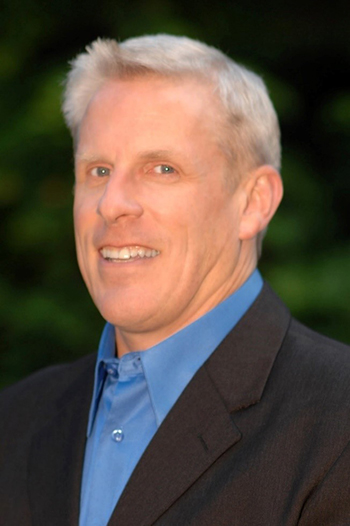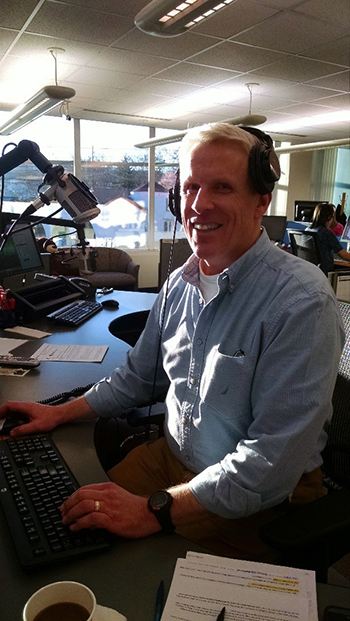 Bob Larson (Ag Information Network of the West, Walla Walla, WA) found his niche working for the student-run college radio station, KBVR 88.7 FM, as a news reporter and eventually news director. Back in the ‘80s, he graduated from Oregon State University (OSU) with a degree in technical journalism. During his time at OSU, he also wrote for the school paper, The Daily Barometer. “After graduation, I moved to Seattle looking for a career in media or public relations, working for a few different organizations, but I eventually found my way back to radio with a job at KOMO in 1995. I started as a talk show board-op and producer, but I found myself back on the news side when the station went from a talk format to a 24-7 news source a couple of years later. In 2006, as things seemed to happen in radio, there was some reorganization at KOMO, and I found myself lured to News-Talk 710 KIRO. About a year later, the iconic KIRO AM station moved to the FM side at 97.3. Over the years in radio news, I’ve enjoyed assignments as a general news reporter, anchor, and editor.” Bob came to the agriculture side of broadcasting in September 2016 after 20 years in Seattle radio, 11 years with KOMO 1000 News, and nine years at KIRO News Radio 97.3 FM. “It wasn’t until early 2016 when I reconnected with an old high school/college buddy, Ag Information Network Owner Kelly Allen, that I found myself reporting on topics that suddenly felt kind of ‘natural.’ Like they say, ‘what goes around, comes around.’” Growing up in Walla Walla, a town of about 30,000 people in the southeast corner of Washington state, Bob spent much of his summertime working for farmers to earn money. From picking strawberries and squash to
Bob Larson (Ag Information Network of the West, Walla Walla, WA) found his niche working for the student-run college radio station, KBVR 88.7 FM, as a news reporter and eventually news director. Back in the ‘80s, he graduated from Oregon State University (OSU) with a degree in technical journalism. During his time at OSU, he also wrote for the school paper, The Daily Barometer. “After graduation, I moved to Seattle looking for a career in media or public relations, working for a few different organizations, but I eventually found my way back to radio with a job at KOMO in 1995. I started as a talk show board-op and producer, but I found myself back on the news side when the station went from a talk format to a 24-7 news source a couple of years later. In 2006, as things seemed to happen in radio, there was some reorganization at KOMO, and I found myself lured to News-Talk 710 KIRO. About a year later, the iconic KIRO AM station moved to the FM side at 97.3. Over the years in radio news, I’ve enjoyed assignments as a general news reporter, anchor, and editor.” Bob came to the agriculture side of broadcasting in September 2016 after 20 years in Seattle radio, 11 years with KOMO 1000 News, and nine years at KIRO News Radio 97.3 FM. “It wasn’t until early 2016 when I reconnected with an old high school/college buddy, Ag Information Network Owner Kelly Allen, that I found myself reporting on topics that suddenly felt kind of ‘natural.’ Like they say, ‘what goes around, comes around.’” Growing up in Walla Walla, a town of about 30,000 people in the southeast corner of Washington state, Bob spent much of his summertime working for farmers to earn money. From picking strawberries and squash to  topping Walla Walla Sweet Onions, or driving a truck or combine in wheat or pea harvest, working in agriculture was a pretty normal summer job for many kids in the Walla Walla Valley. “Working in ag broadcasting for the past two-plus years has been a blast from my past and a fantastic learning experience.
topping Walla Walla Sweet Onions, or driving a truck or combine in wheat or pea harvest, working in agriculture was a pretty normal summer job for many kids in the Walla Walla Valley. “Working in ag broadcasting for the past two-plus years has been a blast from my past and a fantastic learning experience.  The world of agriculture has changed so much since my early involvement, but getting back and talking with the farmers in our state has been like stepping back in time to the days of my youth when so many of the people we knew were either farmers or involved in farming. Reporting for the Ag Information Network has re-energized my passion for news and given me a new direction.” Even though he has lived in the mostly urban/suburban sprawl around Seattle for more than 30 years, he feels like his background is well-suited for ag reporting. “The biggest thing I’ve noticed since moving to the ag beat is how lacking urban news sources are of stories about what’s important in agriculture. The farmers and ranchers certainly know what’s going on; but the general public, especially those not involved in agriculture, really have no idea of the challenges facing the ag sector.” He added, “Whether it’s regulations, the labor shortage, trade, food safety, or any number of important issues, the ag news reported by the mainstream media seems written to fit someone’s talking points and rarely paints the true or entire picture of what is actually going on.” He concludes, “It’s become apparent to me that telling the stories of our producers is more important today than ever. I hope, in some small way, I can help get those messages out there and impress upon our colleagues in the mainstream that getting their information from the people who do the work is better than from what they’ll hear from any advocacy group or politician who may have never even set foot on a farm. So, moving forward, my goal will be to share the stories of the people who make agriculture great with the hope those messages will open the eyes of those who’ve been misled for too long. Being a part of NAFB has been a huge part of my learning process to this point, and I expect it will continue to be an invaluable resource moving forward.”
The world of agriculture has changed so much since my early involvement, but getting back and talking with the farmers in our state has been like stepping back in time to the days of my youth when so many of the people we knew were either farmers or involved in farming. Reporting for the Ag Information Network has re-energized my passion for news and given me a new direction.” Even though he has lived in the mostly urban/suburban sprawl around Seattle for more than 30 years, he feels like his background is well-suited for ag reporting. “The biggest thing I’ve noticed since moving to the ag beat is how lacking urban news sources are of stories about what’s important in agriculture. The farmers and ranchers certainly know what’s going on; but the general public, especially those not involved in agriculture, really have no idea of the challenges facing the ag sector.” He added, “Whether it’s regulations, the labor shortage, trade, food safety, or any number of important issues, the ag news reported by the mainstream media seems written to fit someone’s talking points and rarely paints the true or entire picture of what is actually going on.” He concludes, “It’s become apparent to me that telling the stories of our producers is more important today than ever. I hope, in some small way, I can help get those messages out there and impress upon our colleagues in the mainstream that getting their information from the people who do the work is better than from what they’ll hear from any advocacy group or politician who may have never even set foot on a farm. So, moving forward, my goal will be to share the stories of the people who make agriculture great with the hope those messages will open the eyes of those who’ve been misled for too long. Being a part of NAFB has been a huge part of my learning process to this point, and I expect it will continue to be an invaluable resource moving forward.”
